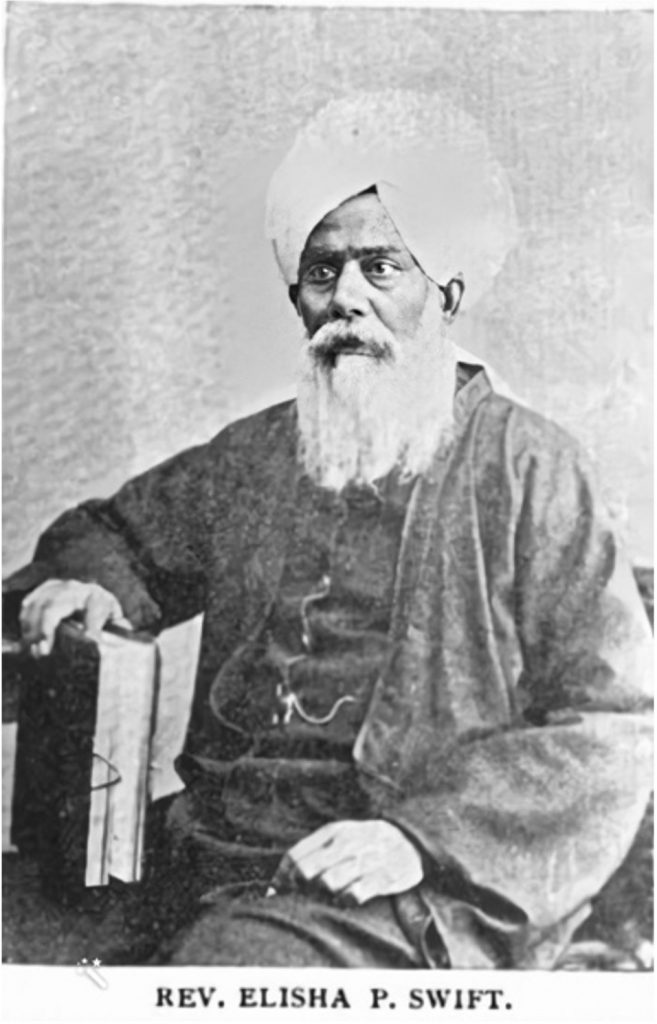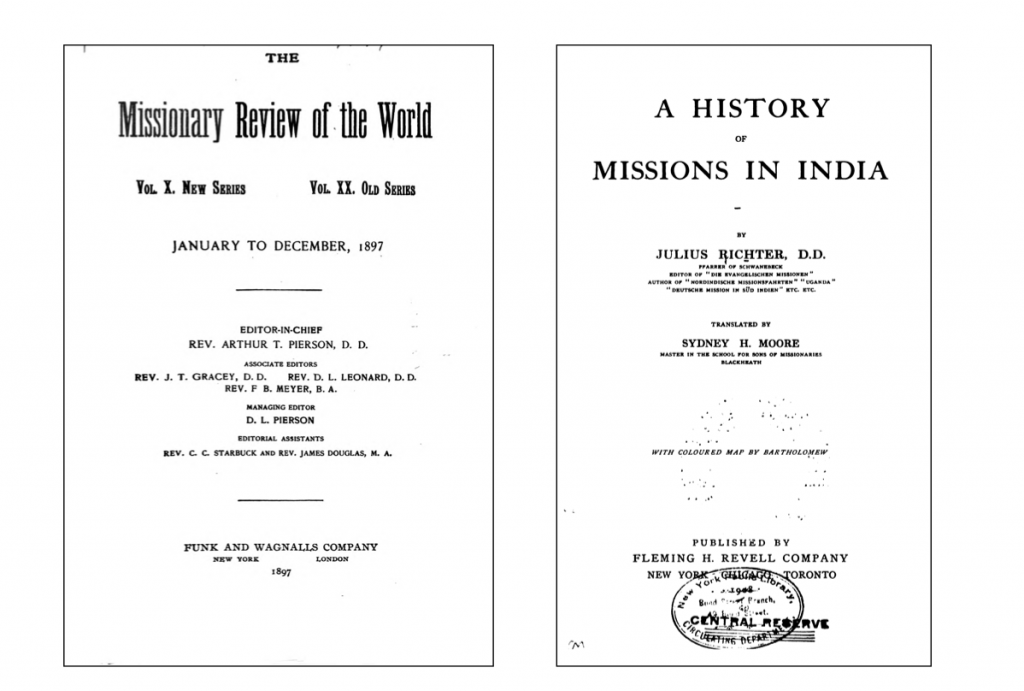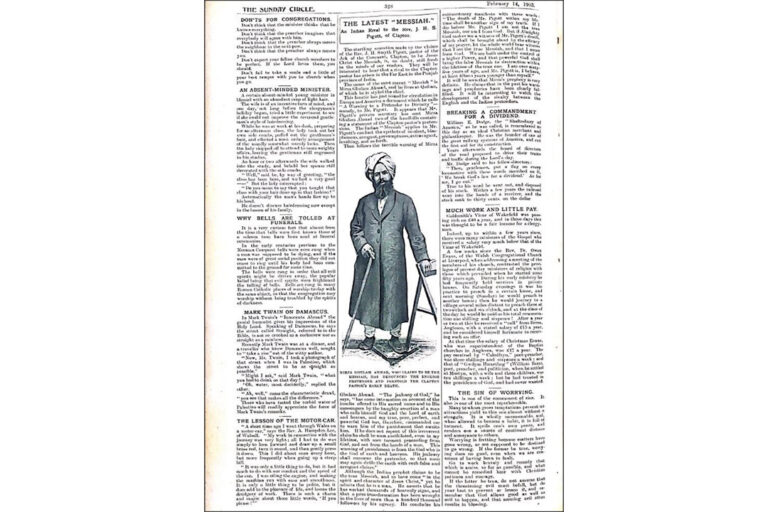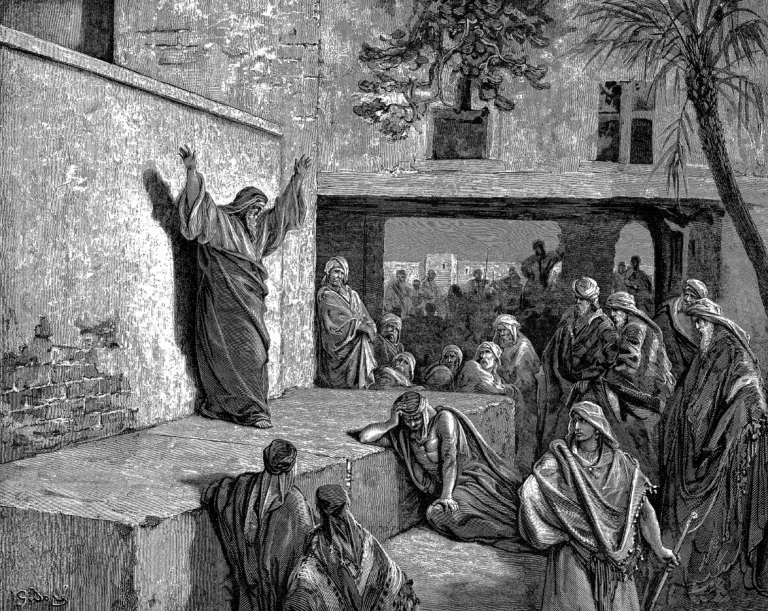Before delving into a deeper discussion on the Promised Messiahas efforts and endeavours to establish the superiority of Islam, it is important to get a glimpse of his early youth and how the early youth was also spent as a means of preparation for his later life. Most of the Promised Messiah’sas early life was spent in seclusion and in the worship of God Almighty and acquiring religious knowledge through private tutors assigned by his father who taught him basic Persian and Arabic. His father, an expert physician, also guided him. He avoided delving into worldly matters as much as possible, whereas his father out of sympathy, desired the opposite for his son. The Promised Messiahas discusses these early years in his book Kitab Ul Barriya in his own words:
“My father was desirous that I should be completely occupied with worldly affairs, which was contrary to my disposition. Nevertheless, out of good will and in order to earn spiritual merit, but not for the sake of any worldly gain, I devoted myself to serving my father and for his sake I occupied myself with worldly affairs and also continued to supplicate the Divine in his behalf. He was assured that I was dutiful towards my parents and he often said that he desired me to participate in worldly affairs out of a feeling of sympathy for me, though he realized that the subject in which I was deeply interested, that is to say, religion, was alone worth pursuing and that he himself was only wasting his time.”[1]
From 1860 or 1861 Hazrat Ahmadas upon the instructions of his father and against his own will, took up the appointment of a minor post at civil administration of Sialkot. In 1867 he resigned his post and returned to Qadian at the request of his father when his mother became critically ill. The time spent in Sialkot was not in vain. The Promised Messiahas became well acquainted with the worldly affairs which are tainted with many ills. He explained that this was essential knowledge for a reformer in order to eradicate such ills.
“While I was under his care, I had most unwillingly spent a few years in the employment of the British Government, but he found that separation from me sat heavy on him and so he directed me to resign from my post. This I gladly did and returned home. My brief experience of official life made me realize that most people in that position lead very undesirable lives. Very few of them carry out their religious duties properly and few of them restrain themselves from indulgence in the illicit pleasures which are meant as a trial for them. I was surprised with their way of life. I found that most of them were eager to collect money lawfully or unlawfully and all their efforts in this brief life were directed towards the world. Only a few did I find who, out of regard for the Divine majesty, cultivated the higher moral values like meekness, nobility, chastity, courtesy, lowliness, humility, sympathy for mankind, purity of heart, eating lawful food, speaking the truth and righteousness. I found most of them afflicted with arrogance, transgression, neglect of religious values, and all types of evil morals. As the wisdom of God Almighty had decreed that I should have experience of all types of people I had to keep company with those of every kind. All this time I spent in great constraint and unease. As the author of Mathnawi Rumi says:
من بہر جمعیتے نالاں شدم جفت خوش حالاں و بدحالاں شدم
ہر کسے از ظن خود شد یار من وز درون من نجُست اسرارِمن
I joined every kind of company those who lived well and those who lived ill.
Everyone in his own concept became a friend of mine but none of them sought to discover my inner secret[2]

The stay in Sialkot, served a purpose: The Promised Messiahas would have frequent discussions on Islam with Hindus and Christians. Sehaj Ram, a Hindu, was the administrator of the workplace where the Promised Messiahas worked and held partiality against Islam and the Holy Prophetsa, the Promised Messiahas would answer him in a way to which he would not have a reply. The Promised Messiahas would discuss religious matters with Lala Bhim Sen, who respected Hazrat Ahmadas and was a witness to the fulfilment of some of Ahmad’s prophecies with regards to his personal affairs. The Promised Messiahas was extremely keen on religious discussions and would regularly debate with Christian missionaries. These included the Reverend Elisha, an Indian priest. During the debate, the Reverend contended that, “Salvation cannot be achieved without accepting Christianity.” The Promised Messiahas Define salvation and what you understand by it in a comprehensive manner.” Reverend Elisha did not give a detailed reply, and quickly ended the debate. His final remarks were, “I have not studied this kind of logic.”
Another such clergyman that Hazrat Ahmad spoke to frequently was Reverend Tayler M. A[3]., a learned scholar who was very impressed by the intellect of the Promised Messiah and held him in high esteem and conversed with him very respectfully. He had a genuine affection for the Promised Messiahas. When Reverend Tayler was returning to England, he came to the Deputy Commissioner’s office for a farewell visit. When the Deputy Commissioner enquired about the reason for his visit, he replied that he had come to meet with the Promised Messiahas because he was planning to return to England and wanted to visit him one last time. He visited the Promised Messiahas at his place of work and sat on the ground with him. After conversing with him for some time, he departed.
From 1872 onwards the Promised Messiahas emerged as a champion of Islam, defending it against the attacks of Christians, Arya Samajists and Bramho Samajists and setting forth the excellence of its teachings in every sphere. He did this by writing articles for publication in newspapers and journals. His earliest article was published in Manshur Muhammadi which used to be published every ten days from Bangalore, Mysore, South India. The collection of these articles from 1878 to 1880 are published in Ruhani Khazaen Vol 2 as ‘Purani Tahrirein’ (Early Writings). In addition to Manshur Muhammadi, he subscribed regularly to Vakil, Safeer e Hind, ‘Vidya Prakash and Riaz Hind, all of which were published from Amritsar, and Brother Hind (Lahore), Aftab Punjab (Lahore), Wazir Hind (Sialkot), Noor Afshan (Ludhiana) and Ishaatas Sunnah edited by Maulvi Muhammad Hussain of Batala. Occasionally he contributed his own articles to some of them, especially those that contained any material against Islam. At a later time, he also subscribed to Akhbar-i-Aam of Lahore.[4]
This time may be regarded as the time of hopelessness for the Muslims, it was the Promised Messiahas who responded to the Christians with courage and intellect and challenged the Christian clerics to debates (one of which is recorded as “A Holy War” a debate with Abdullah Atham and Dr. Henry Martyn-Clark [later to be discussed in detail] who were Senior Anglican missionaries). In response to the allegations against Islam, the Promised Messiah(as) wrote articles and books which received many compliments from Muslim scholars of the time. One such book published was Barahin-e-Ahmadiyya. In five volumes, the Promised Messiahas responded to the onslaught of Christian missionaries. The Promised Messiahas speaking on the Christian efforts wrote:
“Take the Christians, for instance, whose principles appear absurd even at a cursory glance, and yet the consistent efforts of their missionaries have resulted in the growing popularity of their faith, so much so that each year they proudly publish reports of four to eight thousand people joining their ranks. The latest estimates of Christian conversions given by Father Hacker of Calcutta are worrying, to say the least. He writes that whereas there were only 27,000 Christians in India fifty years ago, the number has now risen to 500,000 – [To Allah we belong and to Him shall we return]. Elders of Islam! Do you wait for a time of greater spread of misguidance? There was a time when Islam was the living illustration of the Qur’anic verse: [Men] entering the religion of Allah in troops [110:3]. And look at what is happening today! Do your hearts not bleed at this calamity and are you not overwhelmed by anguish?”[5]
The Promised Messiahas further states:
“Never has there been a greater period of such a dangerous trial for Islam, in fact since the inception of Prophethood, there has never been so. Apart from philosophical and scientific arguments anyone with expertise in any field employs it as a means to try and attack Islam. Both men and women are preaching and through various schemes are trying to detach people from Islam and want them to incline towards Christianity. If one goes into clinics, one would see how alongside giving medicines to patients, the Christian faith is being proselytized, and at times women and children, who are admitted into the hospital, are refused care until they became Christians. Christians were also preaching disguised as religious mendicants. In short, they adopted every possible means for this purpose. One single Christian newsletter or article is published in thousands…if all the literature that has been written against Islam was to be put together, its pile would be a mile high. In fact, without exaggeration, I say that if it was piled up, it would be taller than some of the mountains, and if they were put in a line, it would exceed many miles.”[6]
The passion that the Promised Messiahas had for the defence of Islam and the need to reply to the Christian onslaughts can be seen in the following exchange he had with Hazrat Maulana Nooruddinra who later became the first Khalifa to the Promised Messiahas. Hazrat Maulana Nooruddinra asked, “Is there any special effort that I should put forth to win the love of God? “The Promised Messiahas replied ‘write a book on the refutation of Christian criticism of Islam.’[7]
One of the signs foretold by the Holy Prophet Muhammadsa regarding the advent of the latter-day Messiah was that he would ‘break the cross’.[8] The understanding of this sign became evident with the advent of the Promised Messiahas in an age when Christianity was spreading. The Promised Messiahas described this in the following words:
“What does “breaking the cross” really mean? Pay great heed to this fact that the time of the advent of the Messiah has been associated with the time of the triumph over the cross, and it was the Messiah that was to come for this purpose. It is, therefore, very clear that the purpose of the advent of the Messiah was to completely falsify the Christian ideology with arguments and proofs that were to be strengthened by heavenly succour and miracles. He would show how the religion of the cross is completely false and would make this manifestly clear to the whole world, and millions of souls would come to know and admit that Christianity in reality cannot be a means of mercy for mankind. It is for this reason that all our focus is on the cross – is there any stone left unturned for defeating the cross? The death of Jesus (as) itself has shattered the cross into pieces and when the fact is proven that Jesus (as) did not die on the cross, but in fact died a natural death in Kashmir, anyone from among the intellectuals should come forward and tell us that what is then left of the cross?
“Thus, it is very clear that God Almighty was going to send the Messiah when the “cross” was going to be dominant, meaning the false ideology of Christianity [i.e. the Christian ideology no longer in its original form, having strayed far away from its original teachings by introducing concepts such as the Trinity and Atonement] was going to be at large and for its spread and propagation every type of method would be deployed, and darkness and falsehood (which in other words is shirk or idolatry), and the worship of the dead would be spread all over the world. At such time, the person God Almighty would send would be charged with purifying the world from its state of darkness and falsehood and save them from the curse of worshipping the dead. In this manner, he would break the cross.”[9]
The Christian world reported these challenges against Christianity being raised by the Promised Messiahas albeit in a critical manner.[10] A German Theologian despite his ill-will and criticism of the Promised Messiahas described him as a ‘remarkable man’ who ‘writes clever books, and in such elegant Urdu, Persian and Arabic that he is able to challenge his opponents in the most graceful Arabic literary articles to admit or to disprove his divine mission; besides this he has also inaugurated an English Magazine, The Review of Religions, the lengthy pages of which he fills almost singlehandedly.’[11] Similarly Prof. R. Sirafuddin of Forman College reporting in the Missionary Review of the World stated: “Unlike the Mohammedans universally, who believe Jesus Christ to be alive and yet Christianity to be false, the Mirza has seen the apostolic truth and has come to the conclusion that Christianity stands or falls with the life or death of its Founder. Therefore, the stress laid by him on the death of Christ All his writings his resound with the one note that Christ died like all other mortals and is no longer living.”[12]

The entire edifice of Christianity that was constructed on the Doctrine of Atonement, was supported by the notion of the bodily ascension of Jesus which had also crept into the beliefs of Muslims. This Promised Messiahas proved that the concept of ascension and the physical reappearance of Jesusas during the latter days is entirely erroneous and is not supported by Islamic doctrine. He further proved from the Holy Qur’an and Bible, that Jesusas had survived the Crucifixion, after which he had left Palestine and journeyed to Kashmir in India, where he died a natural death.[13] The Promised Messiahas claimed that the second coming of Jesusas prophesied by the Holy Prophetsa was merely metaphorical. The Holy Prophetsa is described in the Holy Qur’an as having a likeness to Mosesas. Therefore, just as a Messiah for the Mosaic dispensation appeared 1400 years after him, similarly the Messiah for the Islamic dispensation was meant to appear 1400 years after the Holy Prophetsa to complete the resemblance between the two dispensations.
The following verse alludes to this very resemblance between the two dispensations.[14]
اِنَّاۤ اَرۡسَلۡنَاۤ اِلَیۡکُمۡ رَسُوۡلًا ۬ۙ شَاہِدًا عَلَیۡکُمۡ کَمَاۤ اَرۡسَلۡنَاۤ اِلٰی فِرۡعَوۡنَ رَسُوۡلًا
“Verily, we have sent to you a Messenger, who is a witness over you, even as We sent a Messenger to Pharaoh”[15]
However, the physical appearance of both Messiahs was described as dissimilar by the Holy Prophetsa. The Messiah of the Israelites was described as of a ‘red complexion, curly hair and a broad chest,[16] whereas the latter-day Messiah was described as of brown colour and long hair that fell between is shoulders.[17] These two different physical distinctions point towards two different individuals holding the title of Messiah. It was a known fact among the Muslims that the one to revive Islam would be the latter-day Messiah. Jesusas was a descendant from one of the tribes of the Israelites, but the Holy Prophetsa made it clear that this revival of Islam would be brought about by a man from among his ummah.
In one hadith narrated by Abu Hurairara it is stated:
While we were sitting with the Prophetsaw Surat Al-Jumu’a was revealed to him, and when the Verse, “And He (Allah) has sent him (Muhammad) also to other (Muslims)’ (62.3) was recited by the Prophetsa, I said, “Who are they, O Allah’s Messengersa?” The Prophetsa did not reply till I repeated my question thrice. At that time, Salman Al-Farisi was with us. So, Allah’s Messengersaw put his hand on Salman, saying, “If Faith were at (the place of) Ath-Thuraiya (pleiades, the highest star), even then a man from these people (i.e. Salman’s folk) would attain it.”[18]
Similarly, the Messiah foretold by the Holy Prophetsa for the Islamic dispensation was to be born from among the Muslims. As the Holy Prophetsa said:
“How will you be when the son of Mary descends amongst you and is your imam among you.”[19]
A collective study of the Islamic literature about the coming of a reformer concludes with one of two outcomes. 1. There are different individuals who would come to reform Islam i.e., Jesus’s second coming, Mahdi and a man of Persian lineage or 2. All of these are the titles of a single reformer. The latter outcome seems more reasonable as the history of Islam bears witness to the fact that there could not be two leaders at the same time. It is clear from the above Ahadith that the Holy Prophetsa could not have been referring to two different individuals as believed by most Muslims, rather the titles of Messiah, Mahdi and a person of Persian lineage refers to the same individual.
The message of the Promised Messiahas began to spread far and wide and the number of his followers rapidly began to increase. As mentioned earlier, the prophecy “He may cause it to prevail over all religions”[20] was to be fulfilled at the time of the coming of the Promised Messiahas. Thus, the victory of Divine and heavenly signs and intellectual arguments occurred in the lifetime of the Promised Messiahas, and he saw the acceptance of his message throughout the world. It is often suggested from the above-mentioned prophecy that the victory of Islam would be an instant occurrence, whereas this is contrary to the way of Allah as shown through previous prophets of God. Even the greatest prophet of them all did not see the acceptance of Islam by the entire world. Rather he prophesized and gave glad tidings to those who would accept him without seeing him.[21] Christianity took more than three hundred years of persecution and struggle for it to become a tolerated faith when Constantine became the first Christian emperor, and later it became the state religion of Rome in 391AD, under the reign of Theodosius I. Similarly, the Promised Messiahas has stated a similar length of time would pass before the wide acceptance of Islam and Ahmadiyyat.
“Harken, all ye people. This is a prophecy of Him Who had created heaven and earth. He will spread this Community of His in all countries and will make it supreme over all, through reason and arguments. The days are coming, indeed they are near, when this will be the only religion which will be held in honor. God will bestow extraordinary blessings on this religion and Movement. He will frustrate everyone who seeks to destroy it. This supremacy will last till the Judgement Day. Remember, that no one will descend from heaven. All our opponents who are alive today will die and no one will see Jesus son of Mary descending from heaven. Then their next generation will pass away and none of them will see this spectacle. Then the generation next after that will pass away without seeing the son of Mary descending from heaven. Then God will make them anxious that though the time of the supremacy of the cross had passed away and the world had undergone great changes, yet the son of Mary had not descended from heaven. Then the wise people will suddenly discard this belief. The third century after today will not yet have come to a close when those who hold this belief, whether Muslims or Christians, will lose all hope and will give up this belief in disgust. There will then be only one religion that will prevail in the world and only one leader. I have come only to sow the seed, which has been sown by my hand. Now it will sprout and grow and flourish and no one can arrest its growth.”[22]
In his book Tohfa Golarawia, The Promised Messiahas stated:
“The time is approaching when God will grant worldwide popularity to this Movement and this dispensation will spread in the East and the West and the North and the South, and in the world. Islam and this Movement will become synonymous terms. This is a revelation from God on high for Whom nothing is impossible.”[23]
This divine promise of Allah the Almighty was reiterated to the Promised Messiahas as it had been to the Holy Prophet Muhammadsa. This promise came in the form of one of the most famous revelations to The Promised Messiahas.
“I shall cause thy message to reach the corners of the earth.”[24]
Therefore, just as Christian missionaries descended on the East, Allah the Almighty had also planned for the true message of Islam to descend on the West and to win the hearts of its dwellers with the truth. Islam had been perceived as an alien faith to the western world. Although Muslims from North Africa and the Middle East have been travelling to Britain as early as the 16th century or according to some even the 7th century yet apart from trade and economic ties, we do not find a single missionary endeavour from Muslim lands. This missionary endeavour was destined to be at the time of the Promised Messiahas according to the prophecy of the Holy Quran and the Holy Prophetsa.[25] In the words of the Holy Quran “And they planned, and Allah also planned; and Allah is the Best of planners.”[26] Allah the Almighty sent the Promised Messiahas at the appointed time in accordance with His promise. In Dafi Ul-Bala’, (Defence Against the Plague and a Criterion for the Elect of God) the Promised Messiahas comments on this verse:
“The Christian people will make plans and Allah will also make His plans and those will be days of tribulations and say, “O God, grant me a space in a holy land.”[27]
In his book A’ina Kamalat-e-Islam (The Mirror of the Excellences of Islam) the Promised Messiahas wrote:
“The reason for calling the Reformer of this age by the name of the Promised Messiah appears to be that his great task would be to put an end to the supremacy of Christianity and to repel the attacks of the Christians and to demolish their philosophy which is opposed to the Holy Qur’an with strong arguments and to convey to them fully the truth of Islam. The greatest calamity for Islam in this age consists of the philosophical attacks and religious criticism by the Christians, which cannot be repelled without Divine support. It was necessary that someone should come from God Almighty to combat them.”[28]
[1] Kitabul Bariyyah,pp.184 ,footnote./THE RENAISSANCE OF ISLAM by Ch. Zafrullah Khan (ra) P.9
[2] The Essence of Islam Vol 4 P.13-14
[3] The Name has been mistakenly mentioned in the Ahmadiyya history as Butler whereas his actual name was Mr. John Tayler M.A. Refer to the detailed Research published in (Mawazna Mazahab Megazine Jan 2013)
[4] THE RENAISSANCE OF ISLAM by Hazrat Ch. Zafrullah Khan (ra) P.16
[5] Barahin-e-Ahmadiyya, Part I & II, p. 81-82
[6] Malfoozat, Vol. 2 pp. 247-248, 2006 Edition
[7] (Hayat-e-Noor P. 116-119)
[8] Sahih Bukhari, Volume 3, Book 43, Hadith #656
[9] (Malfoozat Vol. 2 pp. 245 – 246, 2006 Edition)
[10] Detail discussion is included in chapter 2.
[11] A History of Missions in India by Julius Richter D.D P.402-403
[12] The Missionary Review of the World Vol X October (new series) P.751. (The following chapters will discuss the Promised Messiahas debates & interactions with the Christian clergy in detail.)
[13] Jesus in India P.17
[14] Ruhani Khazaen, Shahadatul Quran Part 6, P.322
[15] AlMuzzammil 73:16
[16] (Bukhari Volume 5, book 55, Hadith 648)
[17] Sahih Bukhari Volume 4, book 55, Hadith #649)
[18] Bukhari, Volume 6, Book 60, Hadith #4897
[19] Sahih Bukhari, Volume 4, Book 55, Hadith #658
[20] The Holy Quran, Chapter 61, Verse 10
[21] Sahih Muslim The Book of Purification Hadith 249A
[22] Ruhani Khazain Vol 20, Tazkaratush Shahadatain P.64-65
[23] Tohfah-e-Golarhviyyah, Ruhani Khaza’in, vol. 17, pp. 181-182]
[24] (Tadhkirah: English translation, Muhammad Zafrulla Khan, 1976, p. 184.)
[25] Chapter 81 Surah At-Takwir speaks about the signs of the latter day Messiah.
[26] Holy Quran Aale-e-Imran Chapter 3 Verse 55
[27] Dafi‘ul-Bala’, p. 21, Ruhani Khaza’in, vol. 18, p. 241
[28] A’ina-e-Kamalat-e-Islam, Ruhani Khaza’in, vol. 5, p. 341



I like this is a very informative website even with just one article i learned so much about th promissed mesiah (as)